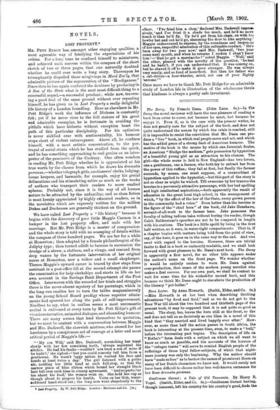The Decoy. By Francis Dana. (John Lane. 6s.)—Tif The Decoy
the novel reviewer will have the rare pleasure of reading a book from cover to cover, not because he must, but because he enjoys it. Even if, as is the case with the present writer, he does not greatly care for the subject of the book, and does not quite understand the means by which the crisis is reached, still it is impossible to resist the conviction that Mr. Dana can pro- duce a "live " book, in which real people move and act, and which has the added grace of a strong dash of American humour. The motive of the book is the means by which one Jeremiah Scales, an American " Sludge the medium," gets possession by hypnotism of a beautiful young girl as an attraction to his seances. The girl—the whole scene is laid in New England—has two lovers, one a gentleman, one a farmer, who both try to extract her from the power of this ruffian; they fail at first, but finally the farmer succeeds, by means, one must suppose, of a counterblast of hypnotism applied to the hypnotist,—but this part of the story is not so clear as might be wished. Till overcome by her trances the heroine is a perversely attractive personage, with her bad spelling and high intellectual aspirations,—both apparently the result of education in the great local high school, in the management of which, " by the effect of the law of the State, every grown person in the community had a voice." Even better than the heroine is the figure of the " chief bore" of the book, old Jake Henshawe, servant-of-all-work to the farmer hero. Jake possesses the faculty of telling tedious tales without boring the reader, though Caleb Balderstone's speeches are not to be compared in length with his orations. The book is a little spoilt by being in the first half written, as it were, in water-tight compartments. That is, if a chapter begins with matters being told from the point of view, say, of the hero, it goes on in the same way to the end. And vice versa' with regard to the heroine. However, these are trivial faults to find in a book so eminently readable, and we shall look forward with great pleasure to Mr. Dana's next book. The Decoy is apparently a first novel, for no other title appears under the author's name on the front page. We wonder whether it would be entirely useless to warn Mr. Dana against over-production, that snare of the modern young novelist who makes a first success. For our own part, we shall be content to wait for some time for his wished-for second book, and this because we think Mr. Dana ought to rise above the production of the literary "pot-boiler."






































 Previous page
Previous page